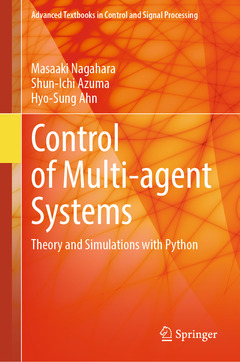Control of Multi-agent Systems, 1st ed. 2024 Theory and Simulations with Python Advanced Textbooks in Control and Signal Processing Series
Auteurs : Nagahara Masaaki, Azuma Shun-Ichi, Ahn Hyo-Sung

This textbook teaches control theory for multi-agent systems. Readers will learn the basics of linear algebra and graph theory, which are then developed to describe and solve multi-agent control problems. The authors address important and fundamental problems including:
? consensus control;
? coverage control;
? formation control;
? distributed optimization; and? the viral spreading phenomenon.
Students' understanding of the core theory for multi-agent control is enhanced through worked examples and programs in the popular Python language. End-of-chapter exercises are provided to help assess learning progress. Instructors who adopt the book for their courses can download a solutions manual and the figures in the book for lecture slides. Additionally, the Python programs are available for download and can be used for experiments by students in advanced undergraduate or graduate courses based on this text.
The broad spectrum of applications relevant to this material includes the Internet of Things, cyber-physical systems, robot swarms, communications networks, smart grids, and truck platooning. Additionally, in the spheres of social science and public health, it applies to opinion dynamics and the spreading of viruses in social networks. Students interested in learning about such applications, or in pursuing further research in multi-agent systems from a theoretical perspective, will find much to gain from Control of Multi-agent Systems. Instructors wishing to teach the subject will also find it beneficial.
Professor Masaaki Nagahara received a bachelor's degree in engineering from Kobe University in 1998 and a master's degree and a Doctoral degree in informatics from Kyoto University in 2000 and 2003, respectively. He is currently a Full Professor at the Graduate School of Advanced Science and Engineering, Hiroshima University. He has been a Visiting Professor at Indian Institute of Technology Bombay since 2017. His research interests include control theory, machine learning, and sparse modeling. He received remarkable international awards:
Transition to Practice Award in 2012 and George S. Axelby Outstanding Paper Award in 2018 from the IEEE Control Systems Society. Also, he received many awards from Japanese research societies, such as SICE Young Authors Award in 1999, SICE Best Paper Award in 2012, SICE Best Book Authors Awards in 2016 and 2021, SICE Control Division Research Award (Kimura Award) in 2020, and the Best Tutorial Paper Award from the IEICE Communications Society in 2014. He is a senior member of IEEE.Professor Shun-Ichi Azuma is author or co-author of 3 books and 5 book chapters; over 100 refereed journal articles in journals such as the IEEE Transactions on Automatic Control, IEEE Transactions on Smart Grid, and Automatica; over 100 refereed conference proceedings, including those of the IEEE CDC and the IFAC World Congress. He received Best Paper Awards in 2005, 2008, 2014, 2016, Best Book Authors Award in 2016, and Pioneer Award in 2011 from the SICE Control Division.
Teaches control theory vital to understand many aspects of modern engineering and social sciences
Python programs help with theoretical learning and experimental work
Solutions manual available for instructors who adopt the book for teaching their courses
Date de parution : 05-2024
Ouvrage de 226 p.
15.5x23.5 cm



